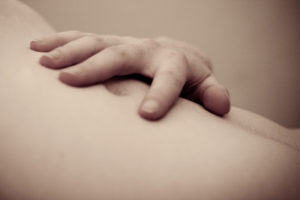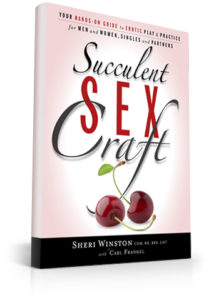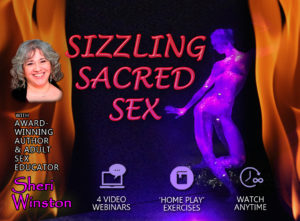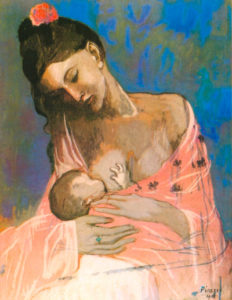Touch Like You’re Madly In Love
 How Touching
How Touching
In part one, I discussed how the period of time when we’re madly in-love tends to come to an end for most couples. However, we can use the unconscious behaviors and actions that came naturally at the beginning of our relationship to keep the blaze burning over the years.
One key is to consciously choose to engage in the same type of intimate early-in-love behaviors. In my last post, I suggested that you fire it up with some liquid lip love, with luscious wet kisses.
Next on the list: the fine art of touch.
Tender Touching
Touch was your first sense, beginning while you still floated in your mama’s womb feeling held, surrounded and safe. You were already touching your own body before you even emerged.
Touch is so fundamental that without it, babies will wither and die. As grown-ups, we won’t die from touch deprivation, but we won’t be as happy and healthy as we would be if our minimum daily touch needs were met. Yet most of us are starved for this essential tactile nourishment.
For people without intimate partners, it can be challenging to get all the touching you want and need. Even people with partners may be touch deprived if we’ve allowed the frequency and the spectrum of touch to diminish.
 Articulate Touch
Articulate Touch
Touch is a basic form of communication—we all speak this universal tongue. It’s also one of our first languages of love, beginning with mother and infant.
At a subtle level, touch transmits intention, emotion, energy, relaxation or tension, and the rhythms of the body. If someone is touching you in a loving way with the intention of giving you pleasure, it feels very different than if they’re touching you solely for their own enjoyment. Comfort, anxiety, caring, attention and distractedness are all transmitted through physical contact.
While touch is a language everyone shares, many people are tremendously confused about the purpose and value of touch, how to share it appropriately, and how to do it masterfully. Touch is complicated, delicate territory. It’s easy to miscommunicate about it. And it’s not always easy to touch with great skill and finesse.
Whether or not a particular type of touch is pleasurable is completely subjective. For instance, the sensation of being tickled may be something you find dreadful or delightful. Personal preferences notwithstanding, when we fully activate our kinesthetic intelligence, we’re most likely to touch our partner in a way they enjoy.
Remember, though, that no one is born knowing how someone else wants to be touched. Which is why we can’t rely on touch alone. To give exquisite touch, even if we’re totally attuned, it helps to add other modes of communication like sound (“Umm!” “Aah!”), words (“More pressure, please”) and body language.
Play A Touching and Feeling Game!
Play this game in total darkness or use blindfolds. This will remove all the visual stimuli and help you focus solely on the sensations of touch.
Touch each other with full attention and awareness. Use your breath to get centered and stay present. Use sounds of pleasure to amplify the sensations and give feedback..
Alternate your attention: Shift your awareness to the part being touched, then toggle back to the part doing the touching. Imagine that you’re stroking velvet as you slide your fingertips along your partner’s skin. Focus on how lovely it feels on your palm, then toggle your attention back to your partner’s skin. Run your fingers through their hair, alternating your awareness of its texture against your fingers with attention to your partner’s pleasure in having their hair stroked. Try to balance your focus so that you’re really feeling as you touch.
After you’re done, have a chat about what happened, what worked or didn’t and what you learned.

The Four Languages of Touch
There are four languages of positive touch—nurturing, healing, sensual and sexual. To keep a relationship vital and satisfying, I believe we need to share all four types of touch.
Here’s a brief introduction to the spectrum of touch.
Nurturing touch transmits caring and acceptance. It’s the kind of tender touch a loving parent gives their beloved child. It helps us feel loved, valued and worthy of being loved.
The second language of touch is therapeutic touch—any form of contact that heals, eases stress, promotes well-being, repairs bodily damage, restores health or palliates pain.
The third language of touch is sensual touch—any form of contact designed to heighten the senses, amplify body awareness and magnify perception. Sensual touch is not explicitly erotic. While it might be a warm-up on the path to arousal and is often an excellent prelude to sexual touch, it’s not designed to be a turn-on in and of itself. Think of it as turning on the senses, not the genitals.
Last but definitely not least, there is sexual touch—any contact that arouses and stimulates. Sexual touch entices your erotic energy to come out and play. It teases, titillates, ignites and (hopefully) satisfies erotic desires.
Remember, new lovers caress, hold, rock, stroke and creatively explore all kinds of different ways to discover and delight with contact. An important strategy to sustain your relationship’s passion is to consciously incorporate all four touch vocabularies into your connections.
Want to know how to fall in love over and over again? Did you miss the first part of this series of posts? No worries — here’s Part One: Kiss Like You Mean It and Part Three: Shine the Love-Light.
 Discover more Touching Succulence!
Discover more Touching Succulence!
Do you dream of having spectacular sex? Can you imagine becoming an erotic virtuoso? Now it’s possible with the help of Sheri Winston’s groundbreaking new book!
Visionary yet practical, Succulent SexCraft offers a detailed road map to supercharging your erotic life and becoming sexually whole and empowered. With its wealth of ideas, practices and games, you’ll be able to access extraordinary pleasure, overcome challenges and learn to play masterfully with your inner ‘sexcraft’ toolkit. It’s your personal guide to developing a healthy, celebratory and ecstatic relationship with your sexuality.
 Check out Intimate Arts Online, our recorded virtual courses to learn at home and at your convenience!
Check out Intimate Arts Online, our recorded virtual courses to learn at home and at your convenience! Want to explore Sizzling Sacred Sex?
Want to explore Sizzling Sacred Sex?














